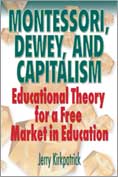Scholarly works in the Objectivist and Austrian Traditions
Reviews • Preface • Excerpt • Behind the Scenes
by Jerry Kirkpatrick, Ph.D., Professor emeritus of International Business and Marketing, California State Polytechnic University, Pomona (Cal Poly Pomona)
Hardcover $42.95, Softcover $18.95, Ebook $1.99
Buy: Amazon, Barnes & Noble, IndieBound
Ebook: Kindle, Apple Books, B&N Nook, Kobo, or Smashwords
Hardcover for libraries: Ingram or Baker & Taylor
This book presents a philosophy of education that requires capitalism for its full realization.
Laissez-faire capitalism is the social system in which all means of production, including roads, schools, and hospitals, are privately owned and operated. The only function of government is to protect individual rights, not to run or regulate businesses, including those in the field of education. I assume that this system is morally and economically unassailable.
My initial ambition was to project the mechanism by which a free market in education might operate, if such were to exist. Today, of course, we have nothing that remotely resembles competitive free markets in education.
By “free market in education” I mean the complete separation of education and state, in the same way and for the same reasons that we now have the complete separation of church and state. All formal schooling would be provided by profit-making entrepreneurs competing with one another for the same parent-student dollar, and the government, whether federal, state, or local, would be completely out of the education business. My aim, therefore, was to describe in broad strokes what a truly free—politically free—educational system would be like. Only by holding a clear vision of the goal, so my assumption stated, can one define the steps required to establish a free market in education. And that would require a thorough understanding of its nature.
By “mechanism” of a free market in education I mean the specific structure of the educational market. How would a free market in education differ from that of the state controlled system we now have? Would there be evaluative grades, examinations, and degrees? What different kinds of educational goods and services would be marketed? And how would such educational businesses operate in terms of aims, teaching methodology, curriculum, and management? In other words, what would a free market in education be like in practice? These are some of the questions I had planned to attempt to answer.
The present work has not strayed too far from this original goal, especially in chapter 5, but in the course of my research I discovered that my interests were more fundamental than the concrete projection and description initially conceived. My reading of history, the history of education, and, especially, the history of educational thought led me to realize that no philosophy of education existed explicitly advocating capitalism for its implementation. John Dewey and his progressive colleagues and predecessors unambiguously advocated the state as the proper provider of education, but advocates of capitalism for the most part argue that the state should get out of education and leave the issue at that. Some of the latter, and I fall into this group, have harshly criticized progressive education and have generally assumed that a form of traditional education would be prominent in a capitalist system; such an education, it was assumed, would be better under capitalistic entrepreneurship than under past and present state control. I no longer hold this assump-tion, for the following reasons.
My long-time admiration of Maria Montessori was shaken somewhat when I read that she considered herself to be a progressive educator. My criticism of Dewey turned to a guarded admiration after I read several of his major works on both education and philosophy.1 My reading of the history of educational thought then put Montessori and Dewey together as the culmination of a trend that has been evolving since at least the Enlightenment. This trend urges educators to respect the child as a unique individual. It argues that tender guidance, not coercion and control, will embolden children to seek the knowledge, values, and skills they need to grow and become independent. The attitude of forcing children to bow to the will of adults, says this trend, along with, more generally, a pervasive insensitivity toward the young, kills the energy and curiosity that otherwise would naturally flourish.
In this trend, however, I noticed a significant problem, especially as it was put into practice in the twentieth century. Progressive educators attempted to respect the uniqueness of individual children by dispensing with coercion in the classroom. At the same time, they coerced the delivery of the classroom itself. They coerced the funds to pay for education by forcibly expropriating money from some parents for the benefit of the children of others. And they compelled all children to fill the seats of the coercively provided classrooms. When I recognized this inconsistency in the policies of the progressives, I realized that there existed a philosophy of education for a free market in education, one that emphasized individual uniqueness and independence but was confusingly commingled with the philosophy of socialism. From this point on I focused my research on development of the purpose, method, and content of education that would imply capitalism. The correct connection between society and child-centered learning is not “democracy and education,” as Dewey’s major educational work is titled—democracy for Dewey and his progressive colleagues being euphemism for unlimited majority rule that supports interventionist economics (if not Fabian socialism) and socialized educa-tion.
The correct connection is capitalism and education.
NOTE
1 Filtered interpretations provided by commentators, followers, and critics are never trustworthy sources of information, especially for writers whose ideas develop in complex historical contexts and, like Dewey’s, are sometimes couched in difficult-to-understand styles.



